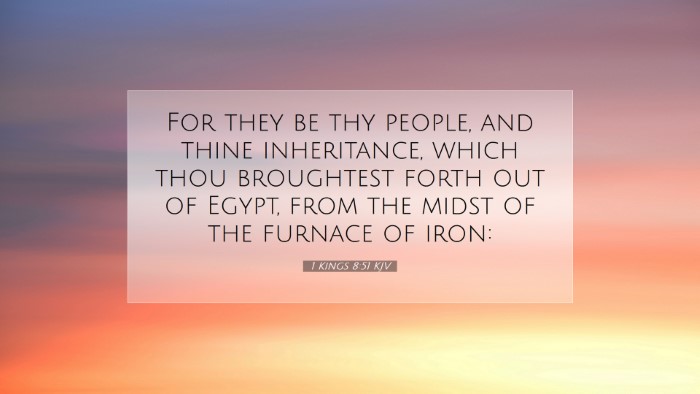Commentary on 1 Kings 8:51
1 Kings 8:51 states: "For they be thy people, and thine inheritance, which thou broughtest forth out of Egypt, from the midst of the furnace of iron."
This verse takes place during Solomon's dedicatory prayer for the temple, emphasizing God's covenantal relationship with Israel and His mighty acts of deliverance.
Contextual Overview
This chapter narrates a pivotal moment in Israel's history, marked by the completion of Solomon's temple. As Solomon addresses the congregation of Israel, he highlights their identity as God’s chosen people, reminding them of their deliverance from Egyptian bondage.
Theological Insights
-
Covenant Identity: The reference to "thy people, and thine inheritance" reaffirms their status as God's elect. This covenant relationship resonates powerfully throughout Scripture. God, from the outset, has always designated Israel as His treasured possession, rescuing them from oppression.
-
Historical Deliverance: The line "which thou broughtest forth out of Egypt" serves as not only a historical reminder but also as a theological assertion of God’s power. The 'furnace of iron' symbolizes suffering and hardship, linking Israel’s past trials to their present blessings. Such themes resonate deeply in the writings of Albert Barnes, who emphasizes the grace bestowed upon a people who have witnessed God's deliverance.
-
The Nature of God’s Deliverance: The term "furnace of iron" suggests a place of extreme trial and oppression. Adam Clarke notes that God’s intervention during these trying times is a demonstration of His sovereignty and compassion. They were not only freed from slavery but were also molded as His people through trials, illustrating the theme of redemption that permeates the narrative of Scripture.
-
God’s Ongoing Faithfulness: Matthew Henry emphasizes the enduring nature of God's covenant. As Solomon prays, he acknowledges the faithfulness of God which remains unaffected by Israel's fluctuating fidelity. Their deliverance is linked to God’s unwavering promises, a reminder for contemporary believers to trust God's continued faithfulness.
Pastoral Applications
Pastors and teachers can draw multiple lessons from this verse when addressing congregational identity and divine faithfulness:
-
Encouragement in Trials: Just as Israel emerged from the 'furnace of iron', believers can find solace in the fact that their trials serve a purpose. God uses difficult periods to refine His people, leading to spiritual maturity and greater reliance on Him.
-
Teaching Covenant Relationship: Emphasizing their role as a chosen people today maintains continuity with the faithful through the ages. This assists congregants in understanding their identity in Christ and the implications of being called 'children of God'.
-
Missional Implications: The call to remember God’s deliverance links directly to the church’s mission in the world today. Just as Israel was entrusted with the testimony of God’s faithfulness, so too is the church called to proclaim the good news of salvation to all nations.
Scholarly Reflections
The scholarly discourse surrounding this passage often revolves around the themes of historical theology and salvation history. The significance of God’s deliverance not only for ancient Israel but also for contemporary believers invites deeper investigation.
-
Historical Context: Understanding the socio-political backdrop of ancient Israel provides a richer comprehension of the text. For instance, the historical narrative is situated during a time when the nation was consolidating its identity post-exodus, and drawing connections between liberation from physical bondage and spiritual liberation can be profound.
-
Systematic Theology: The motifs of inheritance and peoplehood can lead to discussions on soteriology and ecclesiology, weaving together themes of salvation, covenant, and community that emerge from God's interaction with humanity throughout the biblical narrative.
-
Contemporary Relevance: As scholars continue to interpret these ancient texts, it is crucial to apply their theological insights to today’s context. How does this verse inform our understanding of God’s character in a world filled with oppression and suffering?
Conclusion
In conclusion, 1 Kings 8:51 is rich with meaning and relevance for today’s readers. The themes of deliverance, identity, and covenant functionality within the larger narrative of Scripture provide a meaningful foundation for understanding God's eternal faithfulness.
Pastors, theologians, and lay leaders alike can glean from this text to inspire faith and resilience in their communities, upholding the steadfast goodness of God revealed throughout history.


